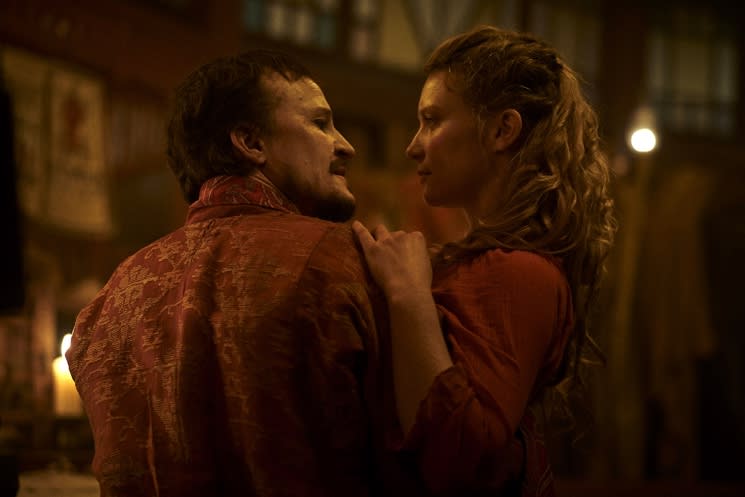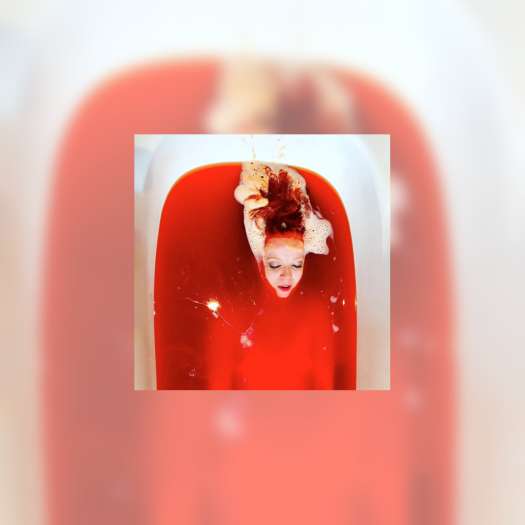Mirrah Foulkes's black dramedy Judy & Punch takes the crude oral tradition of Punch and Judy's crass slapstick puppet shows and subverts the premise. And while this attempt at creative revisionism is intriguing, what we're left with is an overly familiar narrative concerning the precarious and volatile marriage of two puppeteers whose reality starts to resemble their own shows.
Judy and Punch (Mia Wasikowska and Damon Herriman) are the talk of their town for their boorish yet technically impressive marionette show — although what their patrons never realize is the playful dysfunction and comical abuse of the puppets resonates with the ones holding the strings. Behind the scenes, Judy is the long suffering creative force behind the show while Punch, her husband who receives all the credit, is a self-sabotaging alcoholic whose contributions to the show can be distilled to him wanting to make it "punchier." Their tumultuous marriage breaks down after it begins to resemble their material too much, as the creative dysfunction escalates to abuse, murder and ultimately vengeance.
Conceptually, Foulkes' script manages to place an intriguing spin on this antiquated piece of commedia dell'arte and cleverly updates it with a meta-critical narrative. With that being said, Judy and Punch's characters have about as much depth as their puppet counterparts. Despite Wasikowska's subtle indignity and Herriman's rousing boorishness in the roles, Judy and Punch are rendered rather one-dimensionally as the long-suffering spouse and cretinous abuser, respectively. Despite the originality in the premise, the film leaves little question in where it is going, with their tense union making the remixing of the source material less interesting.
Judy & Punch occasionally takes aim at the misogynistic connotations of the Punch and Judy puppet shows from its position of hindsight, and the effort is often too on the nose to be of any meaningful impact. In one sequence, a young patron of their show questions Judy why the punchy protagonist always seemed to win in the end and why can't the wife ever come out on top for once, effectively condensing the entire moral of Judy & Punch's revision into a svelte scene of dialogue. I would not go as far as to say Foulkes was attempting to "correct" the history of Punch and Judy, but the appeals to superficial empowerment in its script make the revisionism choices all the stranger.
Though the leads are strong, and the set design is surprisingly textured in it is English small-town setting, Judy & Punch is an interesting idea undone by lacklustre execution.
Judy and Punch (Mia Wasikowska and Damon Herriman) are the talk of their town for their boorish yet technically impressive marionette show — although what their patrons never realize is the playful dysfunction and comical abuse of the puppets resonates with the ones holding the strings. Behind the scenes, Judy is the long suffering creative force behind the show while Punch, her husband who receives all the credit, is a self-sabotaging alcoholic whose contributions to the show can be distilled to him wanting to make it "punchier." Their tumultuous marriage breaks down after it begins to resemble their material too much, as the creative dysfunction escalates to abuse, murder and ultimately vengeance.
Conceptually, Foulkes' script manages to place an intriguing spin on this antiquated piece of commedia dell'arte and cleverly updates it with a meta-critical narrative. With that being said, Judy and Punch's characters have about as much depth as their puppet counterparts. Despite Wasikowska's subtle indignity and Herriman's rousing boorishness in the roles, Judy and Punch are rendered rather one-dimensionally as the long-suffering spouse and cretinous abuser, respectively. Despite the originality in the premise, the film leaves little question in where it is going, with their tense union making the remixing of the source material less interesting.
Judy & Punch occasionally takes aim at the misogynistic connotations of the Punch and Judy puppet shows from its position of hindsight, and the effort is often too on the nose to be of any meaningful impact. In one sequence, a young patron of their show questions Judy why the punchy protagonist always seemed to win in the end and why can't the wife ever come out on top for once, effectively condensing the entire moral of Judy & Punch's revision into a svelte scene of dialogue. I would not go as far as to say Foulkes was attempting to "correct" the history of Punch and Judy, but the appeals to superficial empowerment in its script make the revisionism choices all the stranger.
Though the leads are strong, and the set design is surprisingly textured in it is English small-town setting, Judy & Punch is an interesting idea undone by lacklustre execution.




